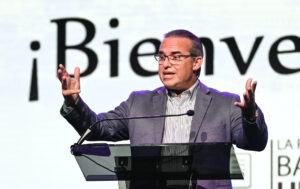
SHELBYVILLE, Ky. (BP) — It’s that brief season of the year when most people are still on track with their resolutions to eat more healthfully and lose weight. In pursuit of that goal, millions have consulted Weight Watchers, Jenny Craig, online diet plans, calorie-counting apps and a host of other nutritional guides — most of which have great value.
But what about the Bible? Does it have anything to say about our eating habits?
Certainly it does. Incorporating Scripture’s wisdom into our New Year’s resolutions could mean the difference between success and failure.
First of all, we should make a distinction between healthy eating and fasting. The Bible says a great deal about fasting, but that’s abstaining from food for a purely spiritual purpose.
Healthy eating habits are a different matter, which the Bible also addresses. For one, the apostle Paul calls the body “a temple of the Holy Spirit” and urges, “You are not your own … glorify God in your body” (1 Corinthians 6:19-20). The context is an exhortation to flee sexual immorality and not profane the body that was created to honor God, but there’s an application to diet as well. Honoring our bodies as sacred temples certainly includes eating healthy foods that keep them functioning well.
The Old Testament, in fact, includes an example of God’s blessing people who eat healthy food. When Daniel and his three friends resolved not to eat the rich food of Babylon but instead make their diet vegetables and water, “they looked healthier and better nourished than any of the young men who ate the royal food” (Daniel 1:15 NIV). Of course, health was not the reason for Daniel’s food choice. It had to do with ritual purity and being set apart from the pagan culture of Babylon, and God honored his obedience. Nevertheless, it was also an occasion when God brought positive consequences from healthy eating. (It’s worth noting that the Old Testament ceremonial laws on diet are no longer in force under the New Covenant, though moral principles related to food still hold. See Acts 10:9-16.) Add Proverbs’ warning about the ruinous effects of gluttony (Proverbs 23:20-21), and this is enough to assure us that God cares about our caloric intake.
Thankfully, though, that’s not all the Bible has to say about eating. Paul says that God “richly provides us with everything to enjoy” (1 Timothy 6:17). The writer of Ecclesiastes makes the connection to eating explicit, telling us that we should enjoy food as a gift from God (Ecclesiastes 3:13). Perhaps that is part of the reason why the Old Testament law required Jews to participate in a series of feasts every year and why scriptural examples of godly hospitality commonly include large quantities of food (see, for example, Genesis 18:6-8; Judges 6:19; 2 Samuel 9:10-13; Luke 15:23).
Jesus Himself instituted the New Covenant at a feast, the Passover meal. And when God wanted to picture for the apostle John the joy that will occur in heaven at Christ’s second coming, He showed him a vision of the Marriage Supper of the Lamb (Revelation 19:6-10) — another meal. God not only cares about healthy eating, there’s also a place for feasting in His economy.
So what does all this mean for dieters? While the Bible doesn’t prescribe any specific diet plan, it does highlight the principle of balance — between healthy restraint and enjoyment of rich foods. In other words, make a habit of disciplined, healthy eating, but on occasion let yourself enjoy a feast of God’s good gifts. Looking forward to the feasts will help keep you going during the seasons of restraint. Interestingly, that distillation of the Bible’s wisdom on eating is the same conclusion that dieticians have reached after thousands of years of scientific research. In Scripture God truly does provide “all things that pertain to life and godliness” (2 Peter 1:3).
–30–
David Roach is a writer in Shelbyville, Ky. This article first appeared at Bible Mesh (www.biblemesh.com), an online discipleship resource to help people from all backgrounds grow in their knowledge of the Bible and how it applies to all of life.
















